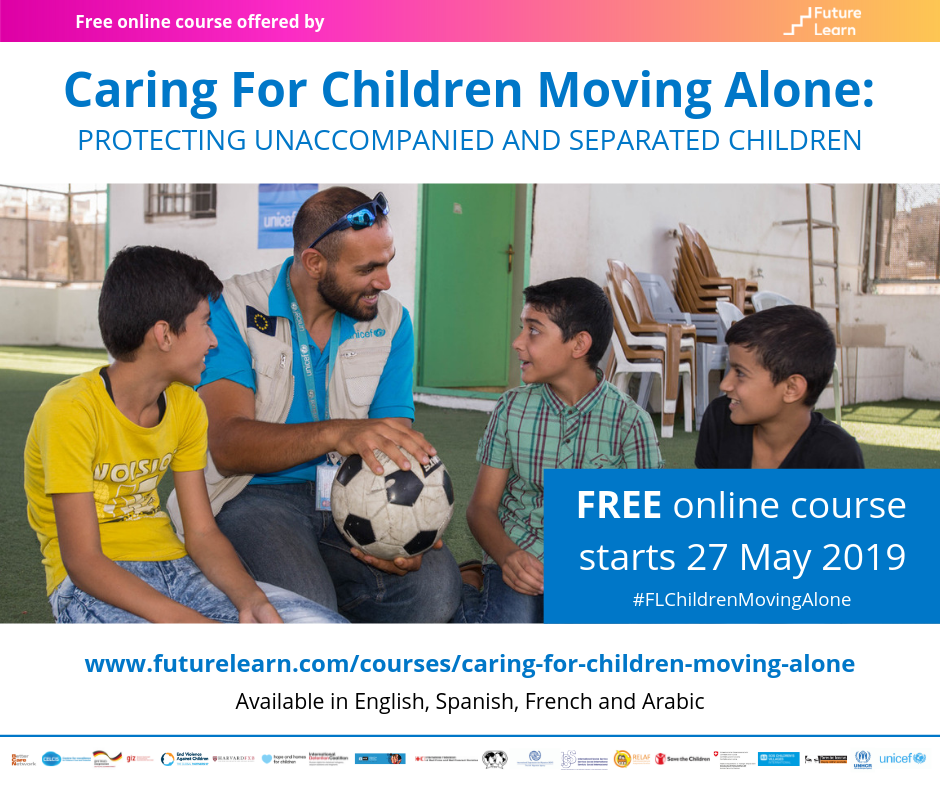Caring for Children Moving Alone: Protecting Unaccompanied and Separated Children
This course explores how to offer the best possible alternative care, protection and support to unaccompanied and separated children on the move.
This is a new, unique course, delivered on the award-winning FutureLearn digital platform.
It is a free six week online course.
The course is available in English, Spanish, French and Arabic.
The first run of the course begins on May 27 2019.
The course is available at www.futurelearn.com/courses/caring-for-children-moving-alone
Information on the project behind this unique new course is available at: www.childrenonthemovemooc.com
It has been created with the support of a number of international agencies who are members of the Geneva-based Taskforce for Children on the Move*, and is sponsored by the Taskforce to enable all learners to achieve a certificate of the completion of their learning free of charge.
*Membership of the Taskforce is comprised of international agencies who work together on initiatives to promote the protection and care of children around the world: Better Care Network; CELCIS; Global Partnership to End Violence Against Children; Hope and Homes for Children (HHC); International Detention Coalition (IDC); International Federation of Educative Communities (FICE); International Federation of Red Cross and Red Crescent Societies (IFRC); International Federation of Social Workers (IFSW); International Organisation on Migration (IOM); International Social Service (ISS); Latin American Foster Care Network (RELAF); Save the Children; SOS Children’s Villages International; Terre des hommes (TdH); United Nations High Commissioner for Refugees (UNHCR). and United Nations Children’s Fund (UNICEF).
Over the six weeks, learners will explore:
1) The reasons unaccompanied and separated children are on the move and the risks they face
2) The importance of alternative care and the protection it can provide for unaccompanied and separated children
3) How to assess the individual needs, circumstances and wishes of each child and identify the most suitable form of alternative care, protection and other services that meet their best interests
4) What is suitable and unsuitable alternative care
5) The importance of working within national child protection systems
6) The importance of co-ordination and co-operation between different professions and different organisations.
What learners will achieve
By the end of the course, learners will be able to:
• Identify the specific risks, vulnerabilities and support needs of unaccompanied and separated children on the move and the application of different appropriate responses
• Apply the content and meaning of relevant international and national legislation and agreements
• Explore the principles outlined in the UN Guidelines for the Alternative Care and discover how suitable care can contribute to the protection of children
• Identify a range of promising practices in relation to suitable alternative care settings that meet the needs, wishes and circumstances of each individual unaccompanied and separated child on the move.
Who the course is for
The course is freely accessible for anyone with any other responsibility or, interest in, unaccompanied and separated children.
This course will be of particular interest to practitioners and policy makers from State and non-State bodies and all those who are working and, in contact with, unaccompanied and separated children on the move as well as children on the move at risk of family separation. This includes frontline professionals and volunteers working directly with children and making decisions on his or her behalf, for example:
• those working within humanitarian organisations (staff and volunteers)
• social workers
• para-social workers
• community support workers
• child protection professionals
• teachers
• government officials (e.g. border staff and migration officers)
• lawyers
• psychologists
• medical workers
• members of the judiciary
• care workers
This course is also appropriate for policy and other decision makers – including political stakeholders –working at an international, regional, national and local level.


Sobre o Autor